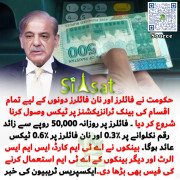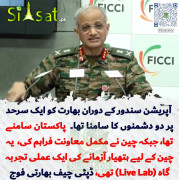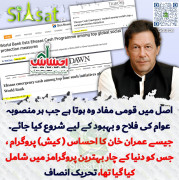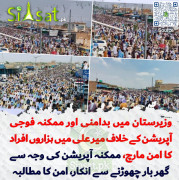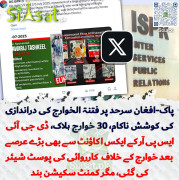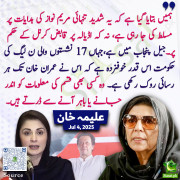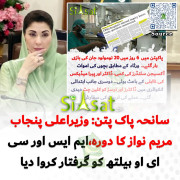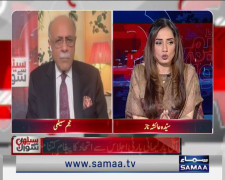maksyed
Siasat.pk - Blogger

Saleem Safi
The New York Timess chief Washington correspondent David Sangers books have stirred up quit an issue: The Inheritance for example has been a center of heated discussions among foreign policy gurus; and his latest account Confront and Conceal is even trending. Beside other issues touched upon in the book, he mentioned that President Barack Obama is worried about Pakistans possible disintegration and the safety of its nuclear warheads in such a case. According to the book, Obamas security advisers are in for a deep dig and hotly debating the future of Pakistan. I am in London for a few days and people here are asking me about this possibility. Well, instead of speculating on the question through think tank perspectives, and academic and theoretical appreciation, lets elaborate it in down-to-earth, fact-based analytical approach.
Before dilating on the issue I must add a few words about the nature and problems in the intelligence system and analysis machinery available to President Obama, and why it at times fails to work. Indeed, America is rich with information about each corner of the globe, and its superiority in technology and use for intelligence gathering is superb. However, richness in information does not result in quality or proper analysis. And prediction, the ultimate product of any analysis, could be misleading if the analysis is not sound. In this age of information and globalisation, the abundance of information again requires local expertise an analyst who can use all related issues and differentiate between most important and relevant factors.
This requires an in-depth knowledge of ground realities and real dynamics of society. In majority of the cases related to Afghanistan and the region surrounding it, i.e., our region, the US has committed analytical blunders, as it tried to read situations through its perspective. The US analysts ignore or simply fail to identify local, historic and social dynamics and, despite having at their command huge resources and superb technology, decision-makers, most of the times are faced with frustration.
Now we talk about the possibility of disintegration of Pakistan. I dont claim that everything is prefect here. On the contrary, I must say that there are so many factors that Obama and his team may have ignored. It seems that we have crossed the limits of corruption and hypocrisy. Extremism has exhibited new contours and dawning each day with new dimensions. Institutions are at war with each other and the military rule is around us as a fat possibility. Economy is virtually on the verge of collapse and popular hopes with the judiciary are now at its lowest ebb. There is no argument that the situation in Pakistan is rife with anarchy. However, perhaps it is smart to remind that the single factor of anarchy do not lead any state to disintegrate. The former Soviet Union and Yugoslavia were not experiencing any anarchy at the time of their disintegration; rather, they were over-controlled and no one could question the governments writ. But both fell out.
In contrast, Afghanistan has been facing anarchy for the last four decades. In these long years, we cannot count a single day when the state enjoyed its writ over the whole of country. During the days of Mujhahideen, there were hundreds of warlords enjoying de facto sovereignty. Even in the Taliban era, their opponents in Northern Afghanistan have their own currency, but Afghanistan is and remains intact.
At surface, no one can deny the headlines Pakistan is making. Disillusionment in Baluchistan, practically no government in FATA, the dynamite mines of Karachi are a reality. But we cannot draw a parallel with the East Pakistan-like situation. The conditions were vastly different when East Pakistan got separated from the western wing. There was lack of interaction, virtual absence of social cohesion and no political and economic interdependence; thus at end of the day East Pakistan got its own identity. In the present day Pakistan, despite facing mammoth corruption, lawlessness, extremism and hypocrisy along with financial and governance crises, we also find some positive signs.
For example, the ANP was once a staunch believer in Pashtun nationalism and was demanding a separate state for Pakhtuns. Today the same party is not only integrated in the mainstream politics but is one of the favorite parties of the Pakistani establishment. The MQM has been transformed from Mohajir Qaumi Movement to Muttahida Qaumi Movement, leaving the politics of Mohajir and advocating the rights of middle-class of every sub-nationality in Pakistan.
It seems that policy analysts around Obama and in think tanks tend to ignore some basic dynamics concerning the possibility of Pakistan disintegration. First and foremost, the Taliban and the extremists in FATA and Khyber Pakhtunkhwa never tried to burn the flag of Pakistan. Unrest in Baluchistan is a fact but, Mehmud Khan Achakzai, sitting in the border area, is neither secessionist, nor have any soft corner for Baluch separatists. The PPP leadership is from Sindh, but their stronghold is located in the farthest north in Chitral. The largest urban center of the country Karachi is now also home to millions of Pakhtuns. Does Shahi Sayed, heading the ANP in Sindh, would ever try to disintegrate Pakistan and go back to his hometown Mardan?
Today the most outrageous voice for the rights of Baluchistan is of Nawaz Sharif, from Punjab. Likewise Jamaat-e-Islamis headquarter is in Lahore but their strongholds are Karachi and Dir of Khyber Pakhtunkhwa. Imran Khans Tsunami, which was started from Lahore, is now most popular in Khyber Pakhtunkhwa. The MQM, which is based in Karachi, won seats in Azad Kashmir and Gilgit-Biltistan assemblies. Businessmen of Karachi have invested in Torkham and Gilgit and trucks of Afridies of the Khyber Agency are moving between Lahore and Karachi.
During the last six decades, Pakistan has developed a complex maze of interdependence among sub-nationalities and interests groups belonging to different areas. There are serious problems within Pakistan but they are mere product of corruption and marathon over-grabbing and snatching resources from one another. Moreover within Pakistan, not a single state institution or non-state actor could benefit from any such disintegration.
While looking at the external front, the situation is more favorable, too. Any likely disintegration is possible on linguistic grounds but in the whole region and the world over no country could drive benefit out of it. China and Iran are out of question. Afghanistan badly needs a peaceful and strong Pakistan while even India cannot afford the disintegration of its immediate neighbour. India wishes to compete and suppress Pakistan but could never afford disintegration. And as Sanger puts it, even Obama does not wish it but fear it.
So here through these lines I wish to comfort all those who fear about the disintegration of Pakistan: strong economic, social, and political interdependence within the country along with regional and global power configuration is a guarantee against any such eventuality. There are problems in Pakistan very serious indeed but they are mere problems, not dynamics of disintegration.
The writer works for Geo TV.
Email: [email protected]
The News







